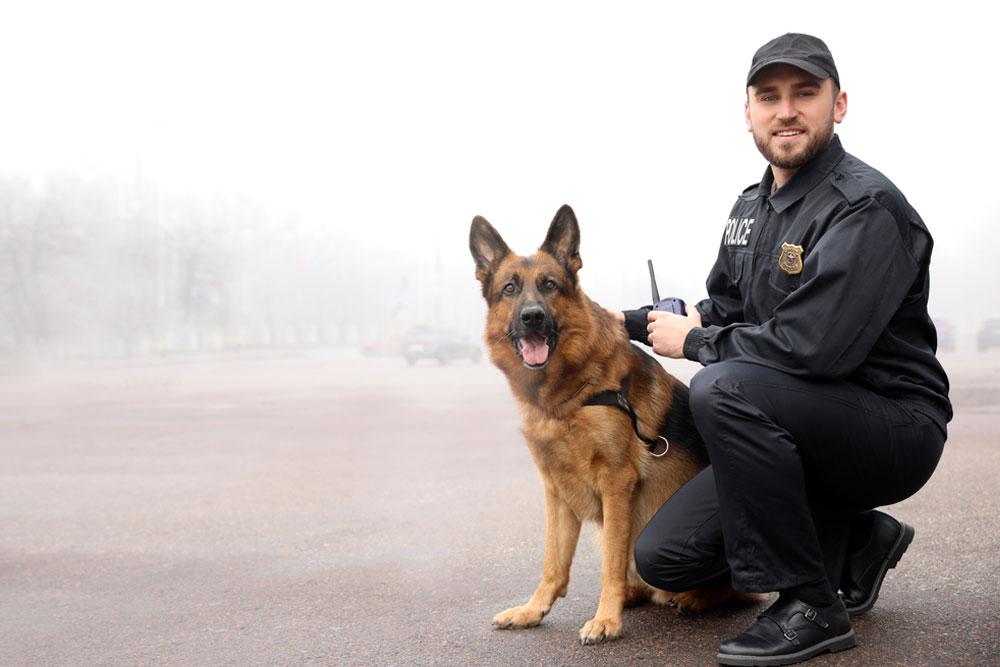Imagine a scene of unparalleled bravery, where a four-legged hero fearlessly leaps into action, protecting the innocent, and apprehending criminals. That hero is the German Shepherd, a breed renowned for its exceptional courage, intelligence, and unwavering loyalty.
In this article, we delve into the captivating world of German Shepherds as police dogs, exploring the reasons behind their selection, their remarkable capabilities, and the deep bond they form with their human partners.
Table of Contents
Why German Shepherds Are the Ultimate Police Dogs
German Shepherds have long been recognized as the ultimate police dogs, and for good reason. With their exceptional intelligence, trainability, and physical capabilities, these dogs excel in law enforcement roles. In this article, we will explore why German Shepherds are the preferred choice for police work and why they are considered the ultimate police dogs.
History of German Shepherds in Police Work
The history of German Shepherds dates back to the late 19th century when a German cavalry officer named Captain Max von Stephanitz sought to develop an intelligent and versatile herding dog. He aimed to create a breed that excelled not only in herding but also in other working roles. The result was the German Shepherd, a breed that quickly gained popularity for its exceptional qualities.
During World War I and World War II, German Shepherds work as police dog and demonstrated their skills as messenger dogs, guard dogs, and search and rescue dogs. Their ability to perform various tasks with unwavering loyalty and determination solidified their reputation as dependable working dogs. After the wars, their talents were further recognized and utilized in law enforcement agencies worldwide.
The Incomparable German Shepherd: A Brief Overview
German Shepherds, also known as Alsatians as well as police dogs, hold a special place in the hearts of dog enthusiasts worldwide. Emerging from Germany during the latter part of the 1800s, these magnificent dogs were originally developed with a specific purpose in mind: guiding and overseeing flocks of sheep. However, it was their extraordinary combination of strength, agility, intelligence, and trainability that captured the attention of law enforcement agencies seeking a breed ideally suited for police work.
Intelligence and Trainability
Renowned for their exceptional intellect, German Shepherds hold a prominent position among the canine community as one of the most highly regarded breeds in terms of intelligence. They possess a keen sense of observation, problem-solving abilities, and an eagerness to learn and please their handlers. This high level of intelligence, coupled with their exceptional trainability, makes them ideal candidates for police work.
Law enforcement agencies value German Shepherds for their ability to quickly grasp commands, follow instructions, and adapt to new situations. Their trainability allows them to perform complex tasks such as tracking scents, detecting drugs or explosives, and apprehending suspects. With proper training and socialization, German Shepherds can become highly skilled and reliable police dogs.
Physical Attributes
With a robust and well-muscled frame, German Shepherds possess the physical attributes necessary for police work. They exhibit impressive speed, agility, and endurance, allowing them to navigate various terrains and excel in physically demanding tasks. Their keen senses, including acute hearing and an exceptional sense of smell, further contribute to their effectiveness as police dogs.
Temperament and Loyalty
German Shepherds have a temperament characterized by confidence, loyalty, and unwavering courage. These traits are essential for police dogs as they encounter challenging and potentially dangerous situations. Their innate protective instincts make them fiercely loyal to their handlers, forging an unbreakable bond that forms the foundation of their exceptional working relationship.
Strong Sense of Smell
German Shepherds have a remarkable sense of smell, which is essential for detecting narcotics, explosives, and missing persons. Their olfactory abilities surpass those of many other dog breeds, enabling them to track scents over long distances and in various terrains.
The Role of German Shepherds in Law Enforcement
German Shepherds play a vital role in law enforcement agencies around the world. They are extensively trained to perform a wide range of tasks that contribute to maintaining public safety and upholding the law. Let’s explore why GermanShepherd known as police dog and some of the key roles in which German Shepherds excel:
Tracking and Search Operations
One of the German Shepherd’s most remarkable abilities is their aptitude for tracking and search operations. Their acute sense of smell, combined with their tenacity and focus, enables them to track and locate missing persons, suspects, or evidence. Whether it’s searching vast areas or detecting specific scents, German Shepherds are invaluable assets in search and rescue missions or criminal investigations.
Narcotics and Explosives Detection
German Shepherds possess an exceptional olfactory system, capable of detecting even the faintest scent of illicit substances or explosive materials. Their rigorous training enables them to identify a wide range of narcotics, such as cocaine, heroin, and marijuana, as well as explosives and their components. By sniffing out hidden contraband or potential threats, German Shepherds help law enforcement agencies combat drug trafficking and prevent acts of terrorism.
Crowd Control and Public Order Maintenance
In situations where maintaining public order and managing crowds is essential, German Shepherds are indispensable. Their imposing presence, combined with their training in crowd control techniques, helps law enforcement officers effectively manage large gatherings or volatile situations. German Shepherds’ mere presence often acts as a deterrent, helping to maintain peace and prevent potential conflicts.
Apprehension of Suspects
When suspects attempt to flee or resist arrest, German Shepherds’ speed, agility, and strength come into play. These remarkable dogs are trained in apprehension techniques, allowing them to swiftly and safely subdue suspects, enabling officers to make arrests without causing unnecessary harm. The mere sight of a German Shepherd bounding into action can deter suspects from attempting to evade justice.
Search and Rescue Operations
The search and rescue abilities of German Shepherds are second to none. Their exceptional scent detection capabilities, agility, and stamina enable them to locate missing persons, survivors of natural disasters, or individuals trapped in dangerous environments. German Shepherds can cover vast areas in search operations, using their keen sense of smell to track scents and locate those in need.
These dogs are trained to work in various terrains, including mountains, forests, and urban settings. Their natural instincts, combined with specialized training, allow them to navigate through challenging obstacles and provide assistance in rescue operations. German Shepherds have saved countless lives and earned a reputation as reliable search and rescue dogs.
German Shepherds as Service Dogs
German Shepherds also serve as exceptional service dogs. They are trained to assist individuals with disabilities, such as visual impairments, mobility limitations, and psychiatric conditions. These highly intelligent and empathetic dogs can perform tasks such as guiding the blind, retrieving objects, opening doors, and providing emotional support.
Their versatility and reliability make German Shepherds well-suited for service dog roles. They can adapt to the specific needs of their handlers and provide invaluable assistance in day-to-day activities. With their calm and composed demeanor, they offer both practical support and emotional comfort to individuals who require assistance.
The Deep Bond Between German Shepherds and Their Handlers
The partnership between a German Shepherd police dog and their handler is nothing short of extraordinary. These dedicated teams spend countless hours training, working, and living together, fostering a bond built on trust, mutual respect, and unwavering loyalty.
German Shepherds form an almost telepathic connection with their handlers, anticipating their commands and responding with precision and unwavering devotion. Their acute ability to read human body language, combined with their natural instincts, allows them to detect even the slightest changes in their handler’s demeanor or behavior.
This bond extends beyond the working environment, as German Shepherds often become integral members of their handler’s families. The loyalty and affection they exhibit towards their human companions are truly heartwarming, reinforcing the deep emotional connection between these remarkable dogs and their handlers.
The Indomitable Spirit of German Shepherds in Police Work
German Shepherds are more than just police dogs; they are true heroes in every sense of the word. Their unwavering courage, intelligence, loyalty, and unmatched work ethic make them an invaluable asset to law enforcement agencies worldwide. From tracking down criminals to detecting narcotics, from maintaining public order to saving lives in search and rescue operations, German Shepherds leave an indelible mark on the world of police work.
The bond between these exceptional dogs and their handlers is a testament to the extraordinary relationship between humans and animals. It is a bond forged in the crucible of trust, training, and shared experiences. Together, they form an unbeatable team, protecting communities, upholding justice, and inspiring us all with their unwavering commitment to serving and protecting.
German Shepherds as Family Pets
Beyond their working roles, German Shepherds make wonderful family pets. Their unwavering loyalty, profound affection, and innate protective instincts have become emblematic traits of German Shepherds. These remarkable dogs are renowned for their steadfast devotion, deep emotional connections, and inherent drive to safeguard their loved ones. With proper socialization and training, they can become loving and gentle companions for families of all sizes.
German Shepherds are highly adaptable and bond closely with their human family members. They are patient and tolerant with children and can coexist peacefully with other pets when introduced properly. However, their protective nature means that early training and socialization are crucial to ensure they develop into well-rounded and balanced family pets.
Training and Selection Process for Police Dogs
The training and selection process for police dogs, including German Shepherds, is rigorous and meticulous. Law enforcement agencies invest considerable time and resources in identifying dogs with the potential to excel in police work. Here are the key aspects of the training and selection process:
Temperament Assessment
During the selection process, candidates undergo temperament assessments to evaluate their suitability for police work. Dogs with stable temperaments, confidence, and a high drive to work are preferred.
Basic Obedience Training
Selected dogs undergo basic obedience training, where they learn essential commands such as sit, stay, come, and heel. This foundation forms the basis for more advanced training.
Specialized Training
German Shepherds destined for police work receive specialized training in areas such as scent detection, tracking, suspect apprehension, and obedience under challenging conditions. Training methods utilize positive reinforcement and reward-based techniques to ensure a strong bond between the dog and its handler.
Handler Training
Handlers of police dogs, including German Shepherds, undergo extensive training to develop the necessary skills to work effectively with their canine partners. They learn how to communicate, control, and maintain the health and well-being of their dogs.
German Shepherds in Law Enforcement Around the World
German Shepherds are widely utilized in law enforcement agencies worldwide. Here are some examples of their roles in different countries:
United States
German Shepherds are commonly employed by police departments throughout the United States. They serve in various capacities, including patrol dogs, search and rescue dogs, bomb detection dogs, and drug detection dogs. The versatility of German Shepherds makes them invaluable assets in combating crime and ensuring public safety.
Germany
As the breed’s country of origin, German law enforcement agencies extensively use German Shepherds in police work. They are highly regarded for their effectiveness in tracking, searching, and apprehending criminals.
United Kingdom
German Shepherds play a vital role in the police forces of the United Kingdom. They are trained to assist in tasks such as crowd control, searching for evidence, and locating missing persons. Their presence helps maintain public order and enhance overall law enforcement capabilities.
Are German Shepherds the only breed used in police work?
No, although German Shepherds are commonly used, other breeds such as Belgian Malinois and Dutch Shepherds are also utilized in police work due to their similar qualities and capabilities.
How long does it take to train a police dog?
The training period for a police dog can range from several months to over a year, depending on the dog’s aptitude, the desired tasks, and the complexity of the training program.
Do all German Shepherds make good police dogs?
Not all German Shepherds possess the necessary traits and characteristics required for police work. Selection processes aim to identify dogs with the appropriate qualities, ensuring the highest chances of success.
What happens to police dogs after their service?
Once a police dog completes its service, they are often retired and may be adopted by their handler or placed in loving homes. Some dogs may continue to live with their handlers as companions.
Can German Shepherds be family pets as well?
Yes, German Shepherds can make excellent family pets. They are loyal, protective, and affectionate with their families. Proper training, socialization, and exercise are essential to ensure a well-behaved and happy pet.
Are German Shepherds prone to any health issues?
Like all breeds, German Shepherds may be prone to certain health conditions. Some common issues include hip and elbow dysplasia, degenerative myelopathy, and bloat. Responsible breeding and regular veterinary care can help mitigate these risks.
Do German Shepherds require a lot of exercise?
Yes, German Shepherds are an active breed that requires regular physical exercise and mental stimulation. Daily walks, playtime, and engaging activities are essential for their well-being.
Can German Shepherds be aggressive?
German Shepherds can exhibit protective instincts, but proper training and socialization from an early age can help ensure they are well-behaved and friendly towards people and other animals.
Are German Shepherds suitable for first-time dog owners?
German Shepherds require experienced handlers or owners who are willing to invest time and effort in their training and care. They can be suitable for first-time owners who are committed to providing proper guidance and meeting their needs.
Can German Shepherds work in extreme weather conditions?
German Shepherds have a thick double coat that provides insulation and protection in various weather conditions. However, extreme temperatures, whether hot or cold, can still pose risks to their well-being, and precautions should be taken.
Conclusion
German Shepherds have rightfully earned their reputation as the ultimate police dogs. Their intelligence, loyalty, courage, and physical capabilities make them well-suited for the demanding tasks of law enforcement. With proper training and handling, German Shepherds excel in various roles, aiding in the maintenance of public safety and the protection of communities. Their contributions to police work are invaluable and continue to be recognized worldwide.

I’m David, an expert contributor and writer, with two furry friends of my own, I know the challenges of raising and caring for dogs. From training to nutrition and health, my goal is to provide valuable insights and advice to help create strong bonds and happy, healthy lives. Find me in Twitter.




